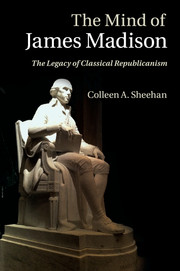Thomas Jefferson's Ethics and the Politics of Human Progress
Could Jefferson claim any consistency in his advocacy of democracy and the rights of man while remaining one of the largest slaveholders in Virginia? This extensive study of Jefferson's intellectual outlook suggests that, once we fully acknowledge the premises of his ethical thought and his now outdated scientific views, he could. Jefferson famously thought the human mind to be “susceptible of much improvement … most of all, in matters of government and religion.” Ari Helo's thorough analysis of Jefferson's understanding of Christian morality, atheism, contemporary theories of moral sentiments, ancient virtue ethics, natural rights, and the principles of justice and benevolence suggests that Jefferson refused to be a philosopher, and did so for moral reasons. This book finds Jefferson profoundly political in his understanding of individual moral responsibility and human progress.
- Reconciles moral philosophy and a slaveholder's antislavery position
- Depicts Thomas Jefferson as not a minimum government ideologue
- Analyzes politics as a moral endeavor in Jefferson's thought
Reviews & endorsements
"This is an extraordinarily important and challenging work of scholarship. There is nothing like it in the literature: no previous writer has offered such a comprehensive, coherent, and compelling account of Jefferson's political, social, and ethical thought. The thrust of Helo's argument is that the conventional parsing out of Jefferson's thought among philosophers, political theorists, and historians has failed to grasp its broad contours. In place of the many Jeffersons who have proliferated in the literature – and in popular (mis)understandings – Helo gives us a single Jefferson who was first and foremost a political actor and thinker and for whom wide-ranging reading always served the interests of his fundamental political and moral commitments."
Peter S. Onuf, Thomas Jefferson Memorial Foundation Professor Emeritus, University of Virginia
"… one of the richest portrayals of Jefferson to date and a welcome contribution to Jeffersonian scholarship … highly recommended …"
Choice
"[I]n Helo's careful retracting of Jefferson's reading, his political positions, and his correspondence, a substantially revised - and decidedly intriguing - portrait of Jefferson as a practical politician and a pragmatic moralist emerges … commendably careful and thorough …"
John Michael, Journal of American History
"Helo explores the rich labyrinth of Jefferson's ethical thought, albeit with the awareness that Jefferson was a politician, not a philosopher … [T]he book also surveys much of the entire firmament of Jefferson's mind, from religion and cosmology to epistemology and metaphysics. Along the way Helo sheds fresh light on Jefferson's various political actions, choices, and principles. Enlivened with a sprightly, occasionally feisty, tone, this work combines impressive learning and erudition with analytic rigor and is consistently guided by its central methodological imperative, to see Jefferson's thought as he saw it, in its broadest contours and on its own terms. It is an exhilarating intellectual ride, one that no student of Thomas Jefferson should miss."
Darren Staloff, American Historical Review
"[A] thorough and complex contribution to Jeffersonian scholarship … The book's five chapters walk the reader through a thicket of Jeffersonian texts, philosophical theories, and historical facts … [Helo] also challenges the commonly held Jeffersonian commitments to agrarianism, constitutions, and small-government … certain sections should certainly be parsed out and explored in other disciplines and classrooms, especially American studies, history, political science, and philosophy. Anthropologists of ethics and cultural critics bent on the Foucauldian notion of self-governance should especially consider the value of this text in terms of its analysis of American leadership as ethical subjects in practice, in private, and in policy production."
Casper G. Bendixsen, American Studies
Product details
December 2013Hardback
9781107040786
298 pages
231 × 160 × 28 mm
0.54kg
Available
Table of Contents
- Introduction to the morality of a slaveholder
- 1. History, progress, and politics
- 2. Progress in natural and moral sciences
- 3. Progress and the wise man's virtue
- 4. The perfectible rights of men
- 5. Progressive politics
- 6. Conclusions: the Jeffersonian ethics of the living.




